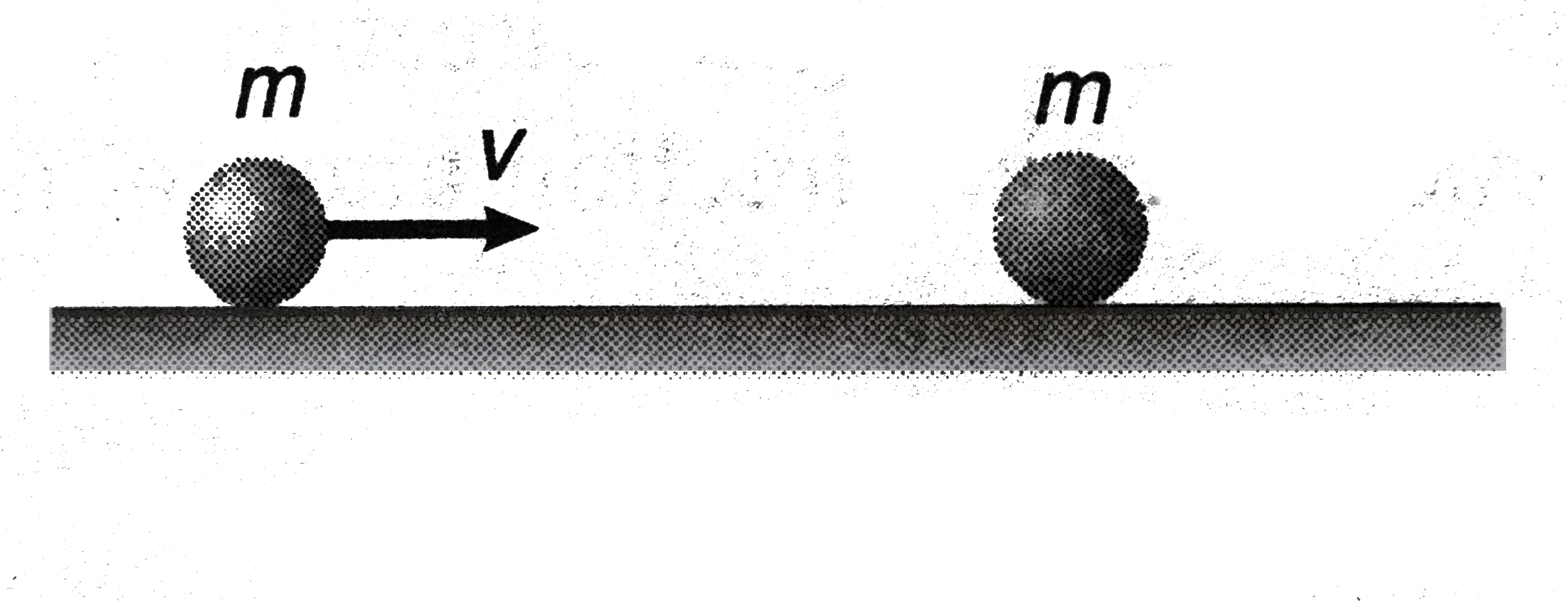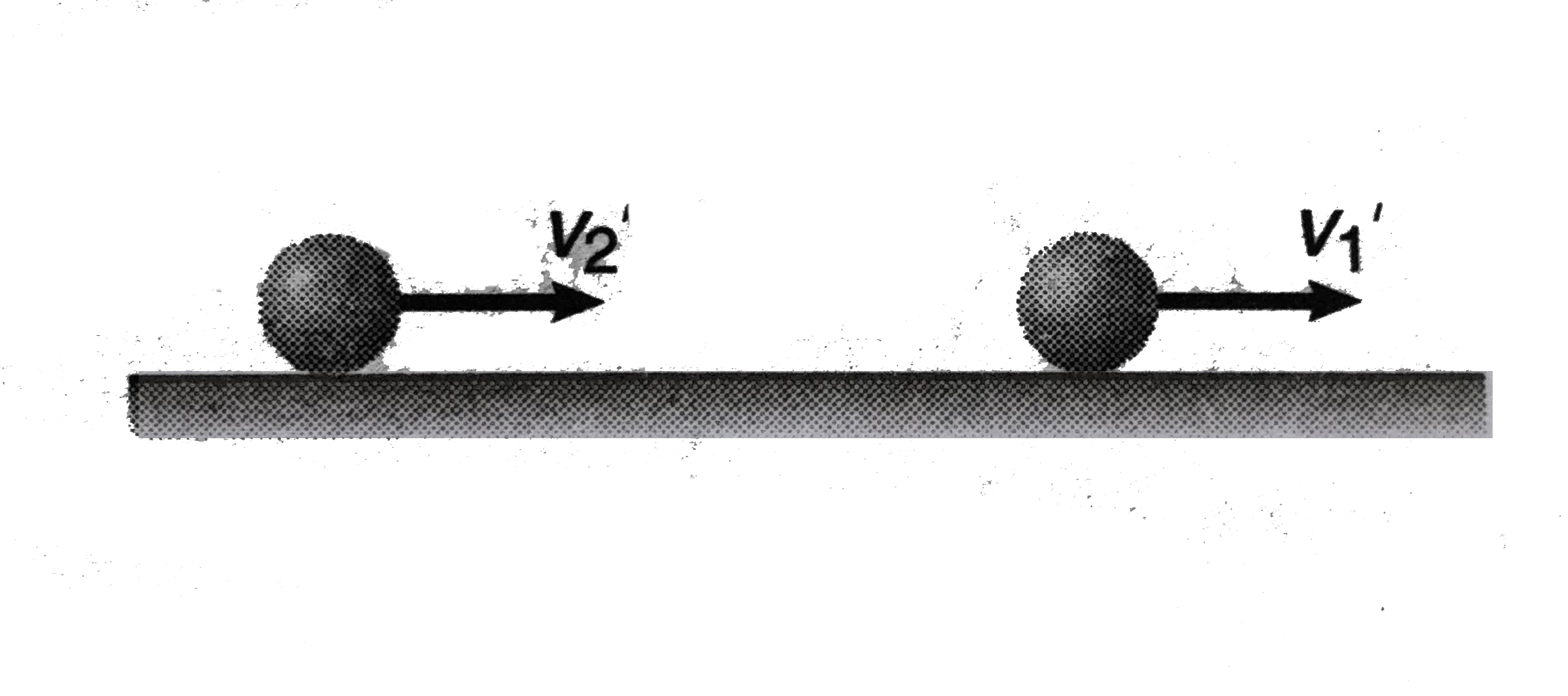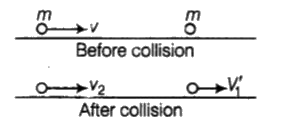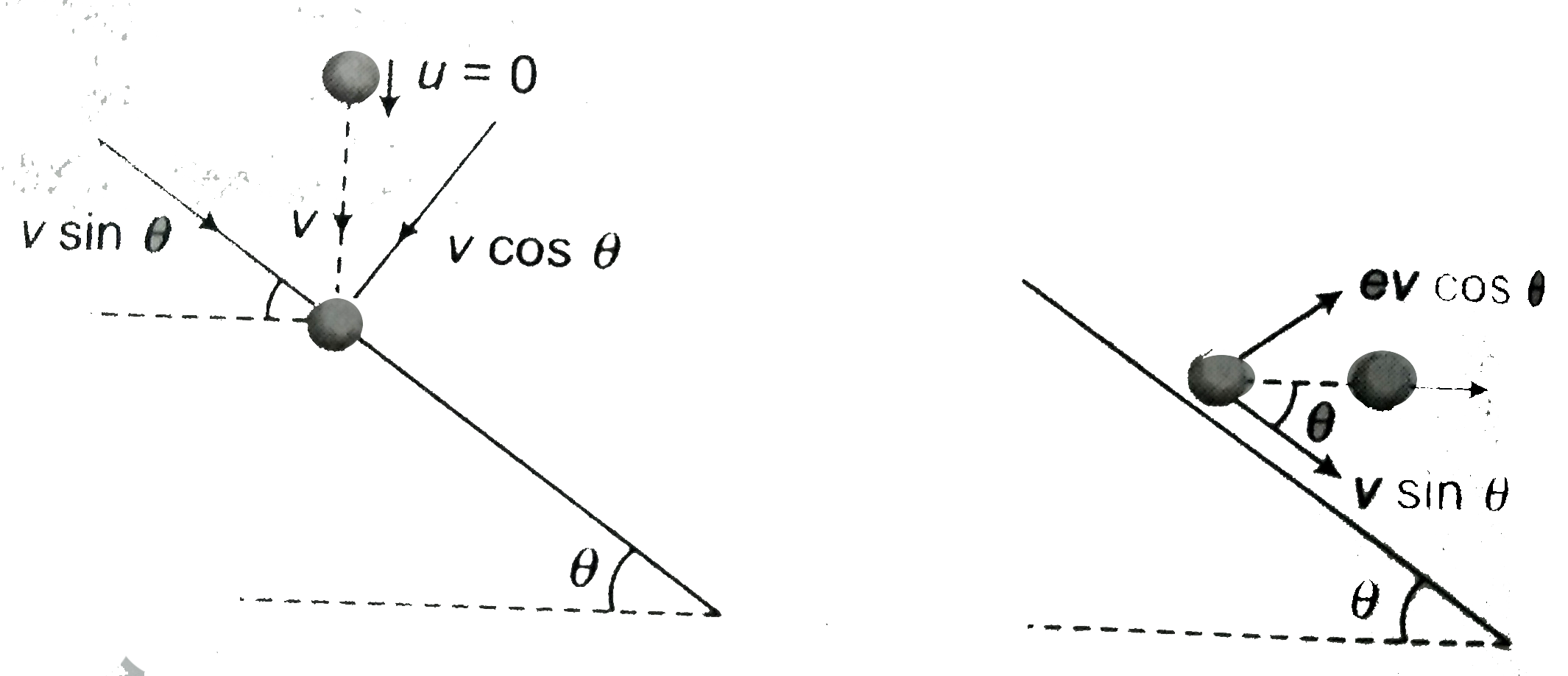A ball of mass moving at speed makes a head on collision with an identical ball at rest. The kinetic energy of the balls after the collision is of the original. Find the coefficient of restitution.
To solve the problem, we need to find the coefficient of restitution e after a head-on collision between two identical balls, where one ball is initially at rest and the other is moving with speed v. The kinetic energy after the collision is given to be 34 of the original kinetic energy.
1. Initial Kinetic Energy Calculation:
The initial kinetic energy KEinitial of the moving ball is given by:
KEinitial=12mv2
2. Final Kinetic Energy Calculation:
After the collision, the total kinetic energy KEfinal is given to be 34 of the initial kinetic energy:
KEfinal=34KEinitial=34(12mv2)=38mv2
3. Using Conservation of Momentum:
Let v1 be the velocity of the first ball after the collision and v2 be the velocity of the second ball after the collision. According to the conservation of momentum:
mv=mv1+mv2
Simplifying, we get:
v=v1+v2(1)
4. Coefficient of Restitution Definition:
The coefficient of restitution e is defined as:
e=v2−v1v(2)
Rearranging gives:
v2−v1=ev(3)
5. Substituting Equations:
From equation (1), we can express v2 in terms of v1:
v2=v−v1(4)
Substitute equation (4) into equation (3):
(v−v1)−v1=ev
Simplifying gives:
v−2v1=ev
Rearranging yields:
v1=v(1−e)2(5)
6. Finding v2:
Substitute equation (5) back into equation (4):
v2=v−v(1−e)2=v(1+e)2(6)
7. Final Kinetic Energy Expression:
Now we can express the final kinetic energy in terms of v1 and v2:
KEfinal=12mv21+12mv22
Substitute equations (5) and (6):
KEfinal=12m(v(1−e)2)2+12m(v(1+e)2)2
Simplifying gives:
KEfinal=mv28((1−e)2+(1+e)2)
8. Expanding and Simplifying:
Expanding the squares:
(1−e)2+(1+e)2=1−2e+e2+1+2e+e2=2+2e2
Thus:
KEfinal=mv28(2+2e2)=mv24(1+e2)
9. Setting Up the Equation:
We know from step 2 that:
KEfinal=38mv2
Setting the two expressions for KEfinal equal:
mv24(1+e2)=38mv2
10. Solving for e2:
Dividing through by mv2 (assuming v≠0):
14(1+e2)=38
Multiplying through by 8:
2(1+e2)=3
Simplifying gives:
1+e2=32
Thus:
e2=12
Finally, taking the square root:
e=1√2≈0.707
Final Answer:
The coefficient of restitution e is 1√2.
The initial kinetic energy KEinitial of the moving ball is given by:
KEinitial=12mv2
After the collision, the total kinetic energy KEfinal is given to be 34 of the initial kinetic energy:
KEfinal=34KEinitial=34(12mv2)=38mv2
Let v1 be the velocity of the first ball after the collision and v2 be the velocity of the second ball after the collision. According to the conservation of momentum:
mv=mv1+mv2
Simplifying, we get:
v=v1+v2(1)
The coefficient of restitution e is defined as:
e=v2−v1v(2)
Rearranging gives:
v2−v1=ev(3)
From equation (1), we can express v2 in terms of v1:
v2=v−v1(4)
Substitute equation (4) into equation (3):
(v−v1)−v1=ev
Simplifying gives:
v−2v1=ev
Rearranging yields:
v1=v(1−e)2(5)
Substitute equation (5) back into equation (4):
v2=v−v(1−e)2=v(1+e)2(6)
Now we can express the final kinetic energy in terms of v1 and v2:
KEfinal=12mv21+12mv22
Substitute equations (5) and (6):
KEfinal=12m(v(1−e)2)2+12m(v(1+e)2)2
Simplifying gives:
KEfinal=mv28((1−e)2+(1+e)2)
Expanding the squares:
(1−e)2+(1+e)2=1−2e+e2+1+2e+e2=2+2e2
Thus:
KEfinal=mv28(2+2e2)=mv24(1+e2)
We know from step 2 that:
KEfinal=38mv2
Setting the two expressions for KEfinal equal:
mv24(1+e2)=38mv2
Dividing through by mv2 (assuming v≠0):
14(1+e2)=38
Multiplying through by 8:
2(1+e2)=3
Simplifying gives:
1+e2=32
Thus:
e2=12
Finally, taking the square root:
e=1√2≈0.707
The coefficient of restitution e is 1√2.
Topper's Solved these Questions
- BOOK - CENGAGE PHYSICSCHAPTER - CENTRE OF MASSEXERCISE - Solved Examples13videos
CENTRE OF MASS
- BOOK - CENGAGE PHYSICSCHAPTER - CENTRE OF MASSEXERCISE - Exercise 1.120videos
CENTRE OF MASS
- BOOK - CENGAGE PHYSICSCHAPTER - CALORIMETRYEXERCISE - Solved Example13videos
CALORIMETRY
- BOOK - CENGAGE PHYSICSCHAPTER - DIMENSIONS & MEASUREMENTEXERCISE - Integer2videos
DIMENSIONS & MEASUREMENT
Similar Questions
On a frictionless surface, a ball of mass m moving at a speed v makes a head on collision with an identical ball at rest. The kinetic energy of the balls after the collision is 3/4th of the original. Find the coefficient of restitution.
View SolutionA ball of mass m moving at a speed v makes a head on inelastic collision with an identical ball at rest. The kinetic energy of the balls after the collision is 34th of the original. Find the coefficient of restitution.

 View Solution
View Solution
Knowledge Check
- Question 1 - Select One
Choose the most appropriate option.
A ball of mass m moving at a speed v makes a head on collision with an identical ball at rest. The kinetic energy at the balls after the collision is 3/4th of the original. What is the coefficient of restitution?
 A1/√3B1/√2C√2D√3
A1/√3B1/√2C√2D√3 - Question 2 - Select One
A ball of mass m moving with a speed v makes a head on collision with an identical ball at rest. The kinetic energy after collision of the balls is three fourth of the original kinetic energy. The coefficient of restitution is
A12B13C1√2D1√3 - Question 3 - Select One
A ball of 4kg mass moving with a speed of 3ms−1 has a head on elastic collision with a 6kg mass initially at rest. The speeds of both the bodies after collision are respectively
A0.6ms−1,2.4ms−1B−0.6ms−1,−2.4ms−1C−0.6ms−1,2.4ms−1D−0.6ms−1,−2.4ms−1
A ball of mas m moving t a speed v makes a head on collisiobn with a identicalbl at rest. The kinetic energy of the blls after the collision is three fourths of the original. Find the coefficient of retitutioin.
View SolutionA ball X of mass 1 kg travellingg at 2 m/s has a head-on collision with an identical ball Y at rest. X stops and Y moves off. Calculate the velocity of Y after the collision.
View SolutionA ball of mass m moving with velocity u strikes another identical ball at rest. Find the velocities of the balls after the collision if the coefficient of restitution is e and the collision is head -on. Also , calculate the loss in K.E.
View SolutionA ball after falling a distance collides an inclined plane of inclination θ. If after the collision , the ball moves horizontally , find the coefficient of restitution.
 View Solution
View SolutionA ball of mass 'm' moving with speed 'u' undergoes a head-on elastic collision with a ball of mass 'nm' initially at rest. Find the fraction of the incident energy transferred to the second ball.
View Solution

